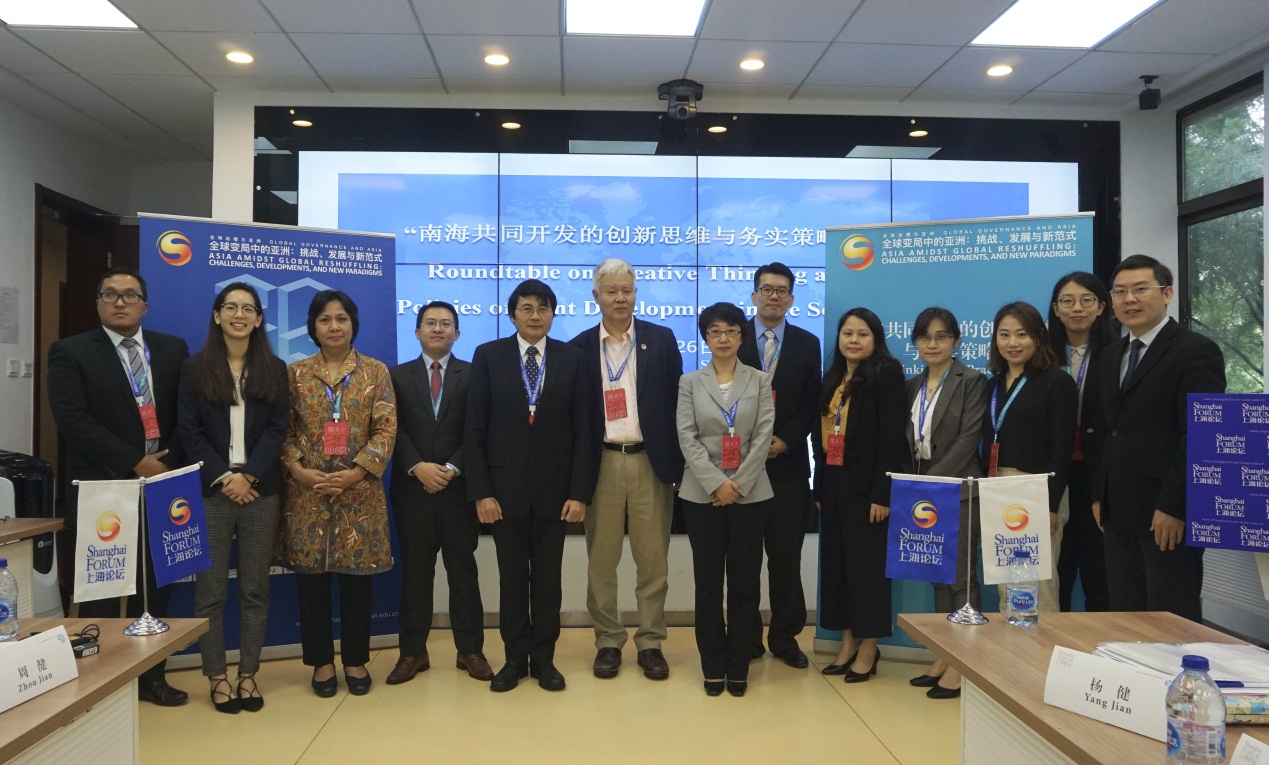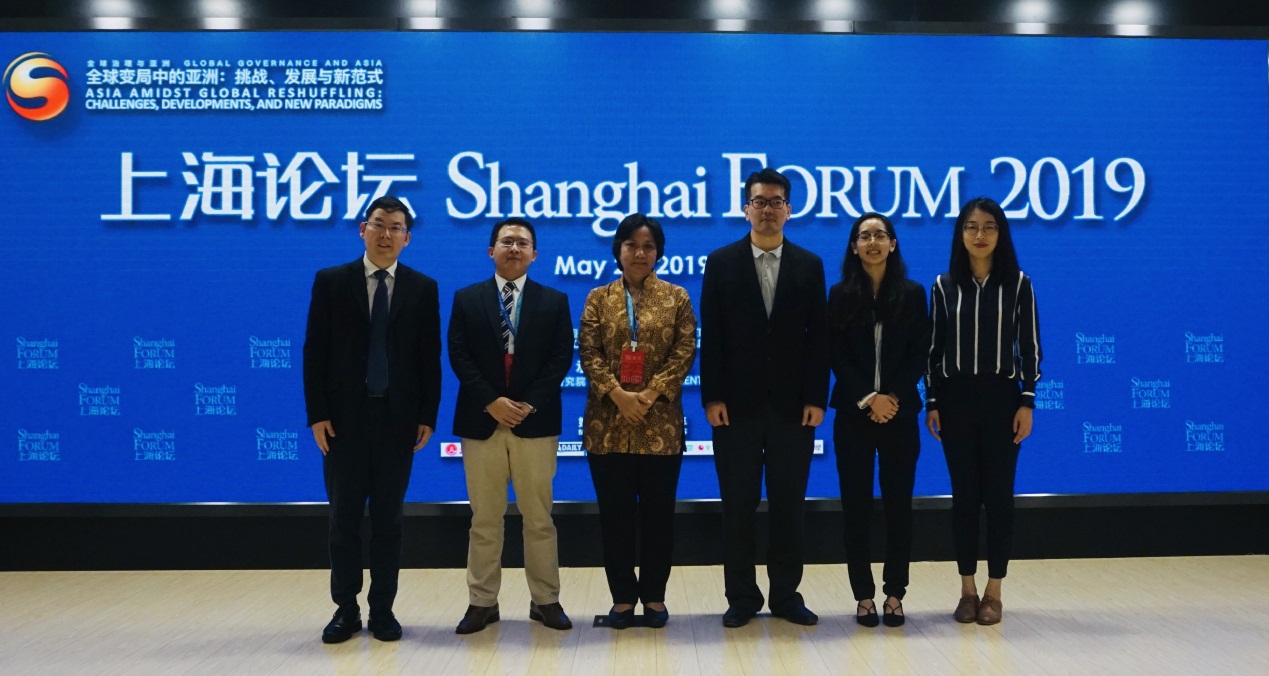On 26 May 2019, the Shanghai Forum 2019 roundtable on “Creative Thinking and Practical Policies of Joint Development in the South China Sea” was jointly held by the Center for China’s Relations with Neighboring Countries of Fudan University (CCRNC-Fudan), the Fudan Development Institute (FDDI), and the Network of ASEAN-China Academic Institutes (NACAI) at Fudan University. The chairman of this roundtable is Qi Huaigao, Deputy Dean of the Institute of International Studies at Fudan University. Eleven scholars and officials from China, Vietnam, the Philippines, Malaysia, Brunei and Indonesia presented at the roundtable.

(Group photo taken at the roundtable on “Creative Thinking and Practical Policies of Joint Development in the South China Sea” on 26 May 2019)
The roundtable was held under the background of a relatively stable circumstance in the South China Sea, in which China, the Philippines, Vietnam and other coastal statesare proactively promotingjoint development negotiation in the South China Sea. Scholars and officials from the coastal states made frank exchanges on the joint development in the South China Sea.
The roundtable mainly discussed three topics: (1) Incentives and policies of China, Vietnam, the Philippines, Malaysia, Brunei, and Indonesia conducting joint development in the South China Sea; (2)the political, legal and technical challenges that joint development in the South China Sea is facing; (3) promoting creative thinking and practical policies of joint development in the South China Sea.
There are two keynote speakers in the “Keynote speech” session of the roundtable. Zhou Jian, Representative for Border and Sea Affairs, Ministry of Foreign Affairs of the People’s Republic of China, gave a keynote speech entitled Fisheries As the First Step of Joint Development in the South China Sea; Siswo Pramono, Director of the Policy Analysis and Development Agency of the Ministry of Foreign Affairs of Indonesia, made a speech entitled “Promoting Business Connectivity among Industrial Parks in the South China Sea Rim and its Vicinity”.
The roundtable was then divided into two sessions. In the first session, Qi Huaigao, Aaron Jed Rabena (Program Convener, Asia Pacific Pathways toProgress), and Bui Thi Thu Hien (Deputy Director, Institute of Chinese Studies, Vietnam Academy of Social Sciences), presented views from the perspectives of China, The Philippines and Vietnam towards the incentives and policiesof the joint development in the South China Sea.
In the second session, Ngeow Chow Bing (Director of Institute of China Studies, University of Malaya), Jolene H.Y. Liew (Graduate student of School of International Relations and Public Affairs, Fudan University), and Evi Fitriani (Senior Lecturer of International Relations Department, Faculty of Social and Political Sciences, Universitas Indonesia) discussed the incentives and policies of the joint development in the South China Sea from the perspectives of Malaysia, Brunei and Indonesia. Hong Nong, Executive Director of Institute of China-America Studies, also joined the discussion from the perspective of the United States. Xue Song, Assistant Professorof CCRNC-Fudan, discussed “What can we learn from failed joint development cases and what they mean to the South China Sea”.
On the morning of 27 May 2019, Qi Huaigao released Cooperative Research Report on Joint Development in the South China Sea: Incentives, Policies & Ways Forward(hitherto referred to “Cooperative Research Report”) on behalf of eight authors from China, Vietnam, the Philippines, Malaysia, Brunei and Indonesia at the Shanghai Forum 2019 “Fudan Think Tank Report Release Conference”. The eight authors of the Cooperative Research Report are: [China] Qi Huaigao, Xue Song, Hong Nong, [Vietnam] Bui Thi Thu Hien, [Philippines] Aaron Jed Rabena, [Malaysia] Ngeow Chow Bing, [Brunei] Jolene H.Y. Liew, [Indonesia] Evi Fitriani. The Cooperative Research Report is the report that has been jointly written and released by scholars from six coastal states of the South China Sea. The Cooperative Research Report is available in both Chinese and English.

(Group photo of part of the authors at cooperative research report release at Shanghai Forum 2019 closing ceremony on 27 May 2019)
The Cooperative Research Report carefully reviews the incentives and policies of the six coastal states government regarding joint development. There are both economic and strategic incentives behind their push for joint development. Economic incentives include: the demand for oil and gas resources in the South China Sea, the sustainable development of resources in the South China Sea, and the establishment of a common market and economic integration in the coastal states of the South China Sea. Strategic incentives include: alleviating tensions among the claimants, promoting peace and stability in the South China Sea, and establishing goodneighboring relations between the coastal states.
The eight authors put forward eight consensus policy recommendations in the Cooperative Research Report: (1) foster deeper mutual understanding; (2) improve strategic communications; (3) finalize the ASEAN-China Code of Conduct (CoC); (4) start joint development in areas with only two claimants; (5) strengthen existing joint development models; (6) focus on less-sensitive areas of the South China Sea; (7) continue the positive trend of maritime security cooperation through various institutions; (8) discuss the feasibility of setting up a Spratly Resources Management Authority (SMRA).
Taking this roundtable and the Cooperative Research Report as an opportunity, CCRNC-Fudan will edit and publish the manuscripts in English on “Joint Development in the South China Sea” in 2020. CCRNC-Fudan will continue working together with relevant scholars home and abroad to further promote academic research and contribute to the development of joint development for the coastal states of the South China Sea.
Download the Cooperative Research Report in English version:
![]() Cooperative Research Report on Joint Development in the South China Sea.pdf
Cooperative Research Report on Joint Development in the South China Sea.pdf
Video: Qi Huaigao released Cooperative Research Report on Joint Development in the South China Sea: Incentives, Policies & Ways Forward at Shanghai Forum 2019 closing ceremony on 27 May 2019






